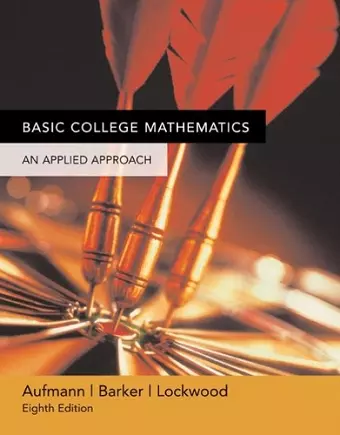Basic College Mathematics
An Applied Approach
Vernon C Barker author Richard Aufmann author Joanne Lockwood author
Format:Paperback
Publisher:Cengage Learning, Inc
Published:7th Jan '05
Currently unavailable, our supplier has not provided us a restock date

With its complete, interactive, objective-based approach, Basic College Mathematics is the best-seller in this market. The Eighth Edition provides mathematically sound and comprehensive coverage of the topics considered essential in a basic college math course. Furthermore, the Instructor's Annotated Edition features a comprehensive selection of instructor support material. The Aufmann Interactive Method is incorporated throughout the text, ensuring that students interact with and master the concepts as they are presented. This approach is especially important in the context of rapidly growing distance-learning and self-paced laboratory situations.
Note: Each chapter begins with a Prep Test and concludes with a Chapter Summary, Review Exercises, and Test. Chapters 2-6 are followed by Cumulative Review Exercises. 1. Whole Numbers Section 1.1 Introduction to Whole Numbers Section 1.2 Addition of Whole Numbers Section 1.3 Subtraction of Whole Numbers Section 1.4 Multiplication of Whole Numbers Section 1.5 Division of Whole Numbers Section 1.6 Exponential Notation and the Order of Operations Agreement Section 1.7 Prime Numbers and Factoring Focus on Problem Solving: Questions to Ask Projects and Group Activities: Order of Operations, Patterns in Mathematics, Search the World Wide Web 2. Fractions Section 2.1 The Least Common Multiple and Greatest Common Factor Section 2.2 Introduction to Fractions Section 2.3 Writing Equivalent Fractions Section 2.4 Addition of Fractions and Mixed Numbers Section 2.5 Subtraction of Fractions and Mixed Numbers Section 2.6 Multiplication of Fractions and Mixed Numbers Section 2.7 Division of Fractions and Mixed Numbers Section 2.8 Order, Exponents, and the Order of Operations Agreement Focus on Problem Solving: Common Knowledge Projects and Group Activities: Music, Construction, Fractions of Diagrams 3. Decimals Section 3.1 Introduction to Decimals Section 3.2 Addition of Decimals Section 3.3 Subtraction of Decimals Section 3.4 Multiplication of Decimals Section 3.5 Division of Decimals Section 3.6 Comparing and Converting Fractions and Decimals a fraction Focus on Problem Solving: Relevant Information Projects and Group Activities: Fractions as Terminating or Repeating Decimals 4. Ratio and Proportion Section 4.1 Ratio Section 4.2 Rates Section 4.3 Proportions Focus on Problem Solving: Looking for a Pattern Projects and Group Activities: The Golden Ratio, Drawing the Floor Plans for a Building, The U.S. House of Representatives 5. Percents Section 5.1 Introduction to Percents Section 5.2 Percent Equations: Part 1 Section 5.3 Percent Equations: Part II Section 5.4 Percent Equations: Part III Section 5.5 Percent Problems: Proportion Method Focus on Problem Solving: Using a Calculator as a Problem-Solving Tool, Using Estimation as a Problem-Solving Tool Projects and Group Activities: Health, Consumer Price Index 6. Applications for Business and Consumers Section 6.1 Applications to Purchasing Section 6.2 Percent Increase and Percent Decrease Section 6.3 Interest Section 6.4 Real Estate Expenses Section 6.5 Car Expenses Section 6.6 Wages Section 6.7 Bank Statements Focus on Problem Solving: Counterexamples Projects and Group Activities: Buying a Car 7. Statistics and Probability Section 7.1 Pictographs and Circle Graphs Section 7.2 Bar Graphs and Broken-Line Graphs Section 7.3 Histograms and Frequency Polygons Section 7.4 Statistical Measures Section 7.5 Introduction to Probability Focus on Problem Solving: Inductive Reasoning Projects and Group Activities: Deceptive Graphs; Collecting, Organizing, Displaying, and Analyzing Data 8. U.S. Customary Units of Measurement Section 8.1 Length Section 8.2 Weight Section 8.3 Capacity Section 8.4 Time Section 8.5 Energy and Power Focus on Problem Solving: Applying Solutions to Other Problems Projects and Group Activities: Nomographs, Averages 9. The Metric System of Measurement Section 9.1 Length Section 9.2 Mass Section 9.3 Capacity Section 9.4 Energy Section 9.5 Conversion Between the U.S. Customary and the Metric Systems of Measurement Focus on Problem Solving: Working Backward Projects and Group Activities: Name that Metric Unit, Metric Measurements for Computers 10. Rational Numbers Section 10.1 Introduction to Integers Section 10.2 Addition and Subtraction of Integers Section 10.3 Multiplication and Division of Integers Section 10.4 Operations with Rational Numbers Section 10.5 Scientific Notation and the Order of Operations Agreement Focus on Problem Solving: Drawing Diagrams Projects and Group Activities: Deductive Reasoning 11. Introduction to Algebra Section 11.1 Variable Expressions Section 11.2 Introduction to Equations Section 11.3 General Equations: Part I Section 11.4 General Equations: Part II Section 11.5 Translating Verbal Expressions into Mathematical Expressions Section 11.6 Translating Sentences into Equations and Solving Focus on Problem Solving: From Concrete to Abstract Projects and Group Activities: Averages 12. Geometry Section 12.1 Angles, Lines, and Geometric Figures Section 12.2 Plane Geometric Figures Section 12.3 Area Section 12.4 Volume Section 12.5 The Pythagorean Theorem Section 12.6 Similar and Congruent Triangles Focus on Problem Solving: Trial and Error Projects and Group Activities: Investigating Perimeter, Symmetry
ISBN: 9780618503056
Dimensions: unknown
Weight: 1369g
704 pages
8th edition